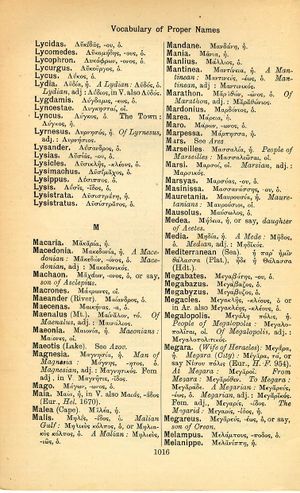Maia
ἀσκεῖν περὶ τὰ νοσήματα δύο, ὠφελεῖν ἢ μὴ βλάπτειν → strive, with regard to diseases, for two things — to do good, or to do no harm | as to diseases, make a habit of two things — to help, or at least, to do no harm
English > Greek (Woodhouse)
Μαῖα, ἡ, in V. also Μαιάς, -άδος (Eur., Hel. 1670).
Latin > English (Lewis & Short)
Māia: Māja (written by Cicero Majja, like ejjus, pejjus, etc.;
I
v. the letter J), ae, f., = Μαῖα.
I Daughter of Atlas and Pleione, and the mother of Mercury by Jupiter, Cic. N. D. 3, 22, 56: Majā genitum demittit ab alto, i. e. Mercury, Verg. A. 1, 297: Maiā natus, Hor. S. 2, 6, 5; Ov. M. 11, 303; Macr. S. 1, 12, 19; acc. Majam, Ov. F. 4, 174.—As one of the Pleiades: sanctissima Maja, Cic. Arat. 270: multi ante occasum Majae coepere, Verg. G. 1, 225; Ov. F. 4, 174; 5, 85.—
II A daughter of Faunus, Macr. S. 1, 12.
Latin > French (Gaffiot 2016)
(2) Măia æ, f., Maïa
1 fille d’Atlas et de Pleioné, mère de Mercure : Cic. Nat. 3, 56 ; Hor. S. 2, 6, 5 ; Virg. En. 1, 297 ; Ov. M. 11, 303 || est aussi une des Pléiades : Virg. G. 1, 225 ; Cic. Arat. 34, 37 ; Ov. F. 4, 174
2 fille de Faunus, divinité romaine incarnant le printemps, dont la fête se célébrait en mai : Macr. Sat. 1, 12.
Latin > German (Georges)
(2) Māia, ae, f. (= die Hehre, v. maius, a, um), Tochter des Atlas und der Plejone, Mutter Merkurs, Cic. de nat. deor. 3, 56. Macr. sat . 1, 12. § 19; eine von den Plejaden, Cic. Arat. 36. Verg. georg. 1, 225: Maiā genitus, Merkur, Verg. Aen. 1, 297: ders. Maiā natus, Hor. sat. 2, 6, 5; u. Maiā creatus, Ov. met. 11, 303: Akk. Maiān, Ov. fast. 4, 174. – Dav. Māiadēs, ae, m., der Sohn der Maja, der Majade, v. Merkur, Prisc. 2, 34 (ohne Beleg).

